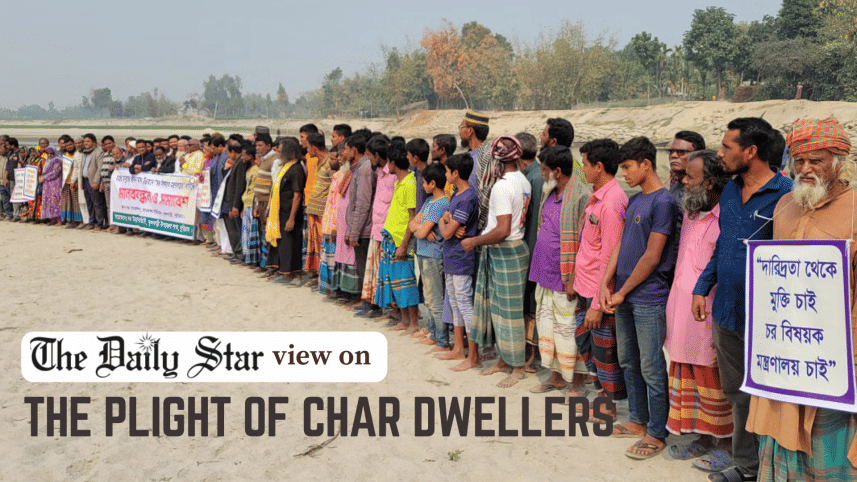How long will char dwellers be neglected?

We are saddened to see the plight of char dwellers who continue to be denied basic necessities. A recent report in this daily has highlighted the dire living conditions in many chars in Kurigram, where people struggle to earn enough for a tolerable life as they constantly battle floods, droughts, and erosion throughout the year. Improving their quality of life is a battle they cannot win on their own, without proper government support.
Kurigram district alone has 450 chars that are home to around 5.5 lakh people. Unfortunately, employment opportunities in these areas remain scarce. While agriculture is their main source of livelihood, farmers often lack the necessary support to sustain their work. They are forced to sell their produce at low rates while paying exorbitant prices for essential goods. Amid this bread-and-butter struggle, sending their children to school is a luxury many cannot afford.
Not just in Kurigram, those living in chars in other districts also suffer immensely, especially during floods, amid inadequate government relief operations. According to a char resident in Kurigram, during floods, they receive only a few kilogrammes of relief, and in winter, just a blanket—nothing more. Meanwhile, child marriage and malnutrition remain at alarming levels, and healthcare services are virtually nonexistent, with women and girls suffering the most.
Unfortunately, the government's attempts to improve their situation often lack proper planning and sustainability. For instance, six years ago, to rehabilitate 450 families displaced by natural disasters, the government established three cluster villages on chars in Khulna's Koyra upazila. However, as a recent Prothom Alo report revealed, these houses have already been damaged by tidal surges due to their proximity to the riverbank, a development that should have been foreseen.
We, therefore, urge the government to adopt a bottom-up approach to address the struggles of char dwellers and implement well-thought-out measures to improve their living conditions. Creating sustainable employment opportunities and providing necessary agricultural support should be prioritised. Given that chars are highly disaster-prone areas, the government must pay special attention to disaster preparedness and mitigation. It is unacceptable that residents of remote chars still lack access to basic education and healthcare. These issues must be addressed immediately. Since several NGOs are already working in these regions, the government should coordinate with them to design effective and comprehensive interventions.



 For all latest news, follow The Daily Star's Google News channel.
For all latest news, follow The Daily Star's Google News channel. 
Comments